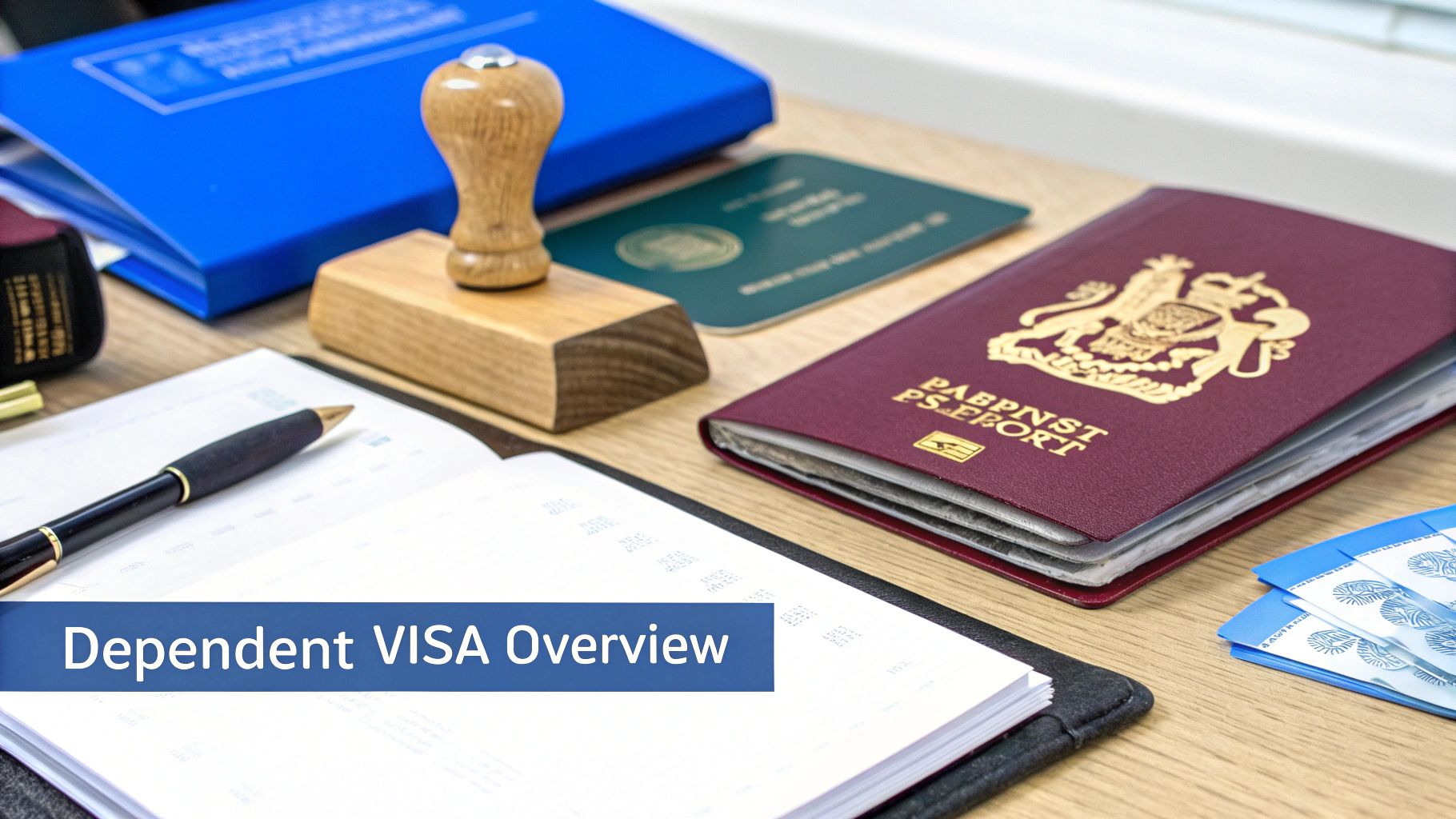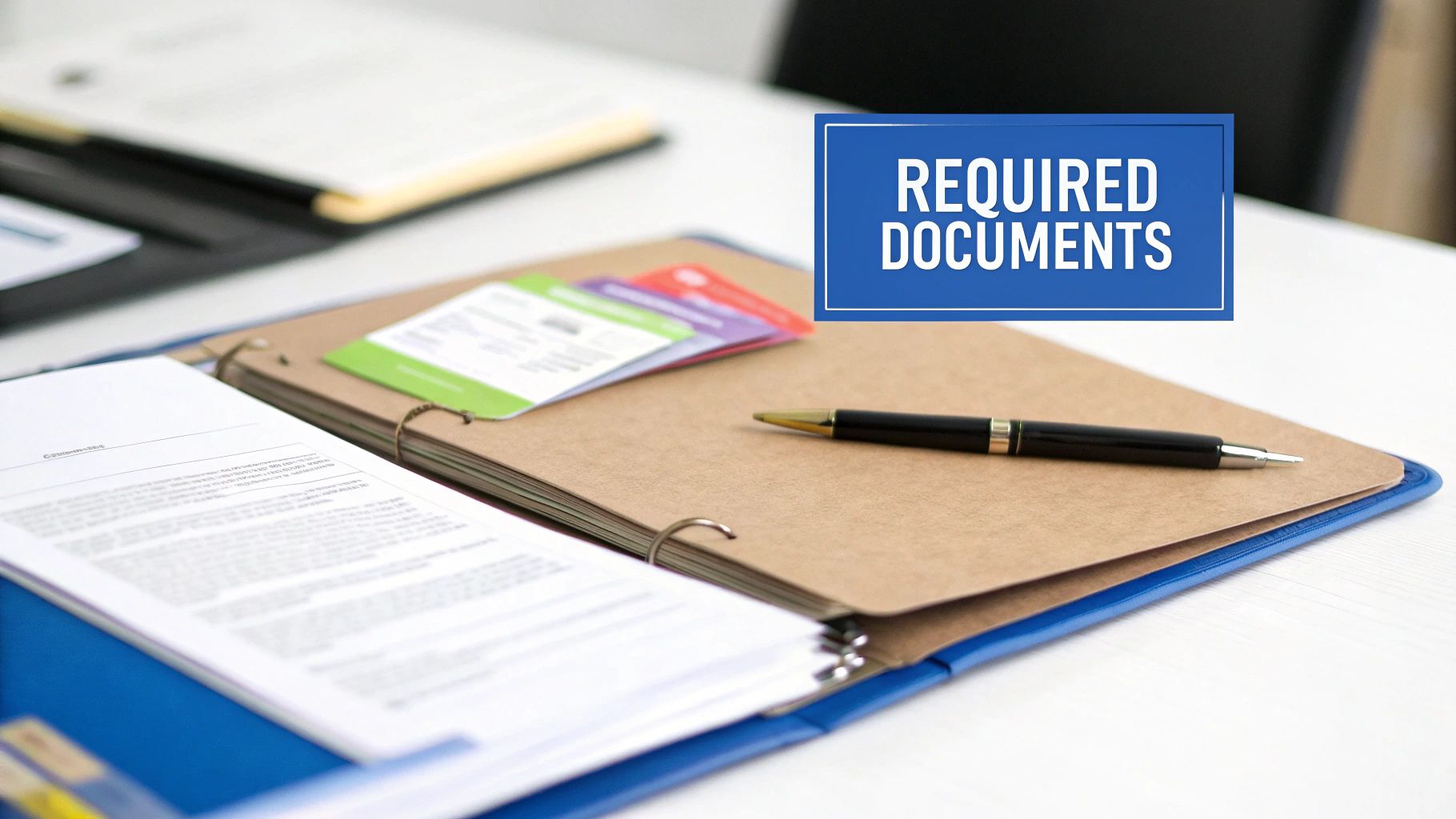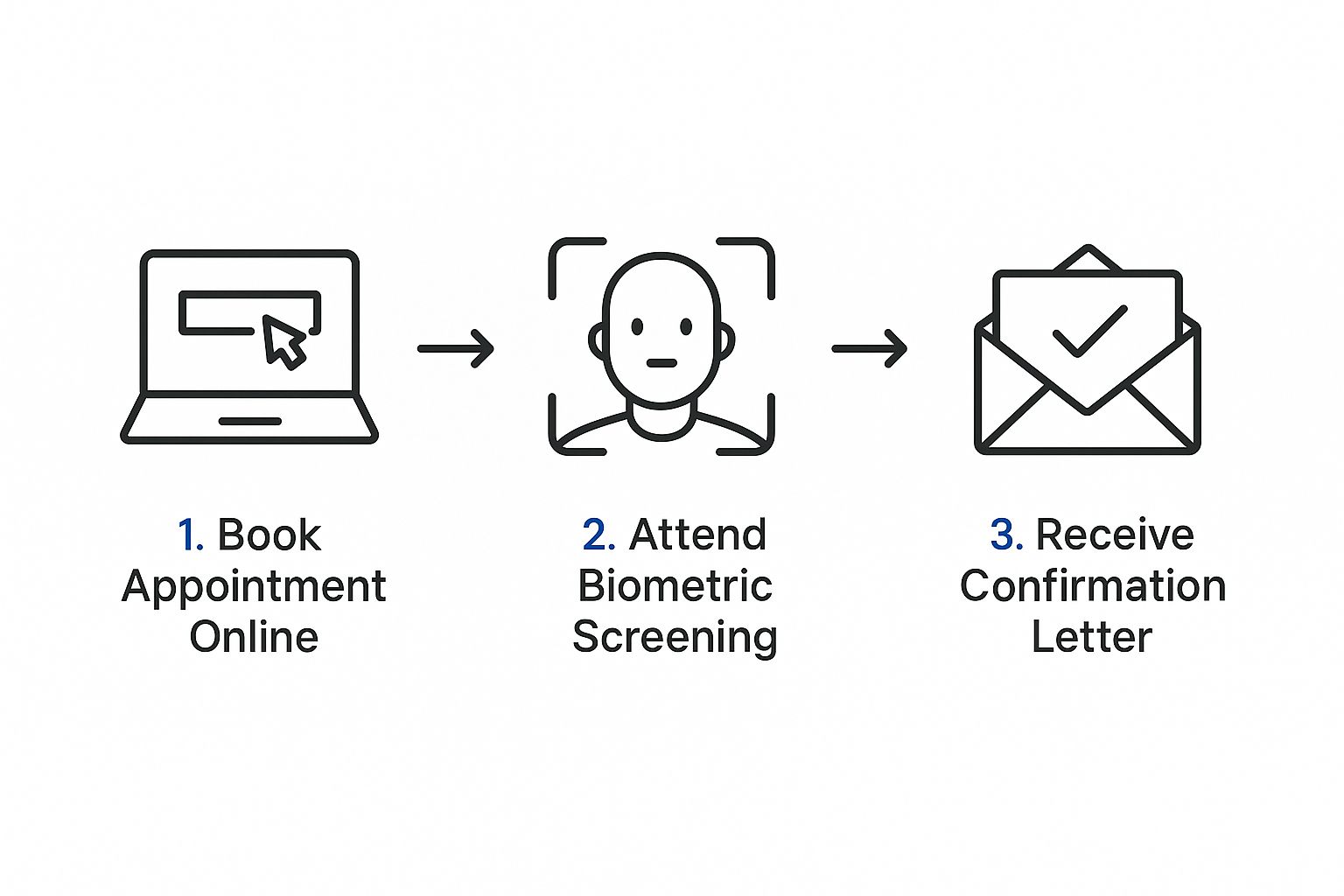Dependent Visa UK Requirements: Your Essential Guide

Think of a UK Dependent Visa as a linked ticket. It’s not a standalone pass to enter the UK; instead, it allows you to join someone who already holds a primary visa, like a work or study visa. This connection is the most important thing to understand – your right to be in the UK is completely tied to the main visa holder.
The entire system is designed with a simple goal in mind: keeping families together.
Understanding the UK Dependent Visa

Imagine the UK's immigration system as a collection of different routes. The Dependent Visa isn't a route in itself but rather a path that branches off from another, primary one. For example, if the main applicant has a Skilled Worker visa, their family members join them on that specific path.
This principle underpins all dependent visa UK requirements. Your journey, from the initial application right through to potentially settling in the UK, will directly mirror the person you're joining. If their visa is granted for three years, yours will be too. If they have to leave the UK, your permission to stay generally ends as well.
Who Counts as a Dependent?
The UK Home Office is quite specific about who qualifies as a 'dependent'. It’s the first and most critical hurdle you'll face. Broadly, dependents fall into two clear categories:
- Partners: This can be a spouse, a civil partner, or an unmarried partner. For unmarried partners, you must prove you've been in a genuine relationship, like living together, for at least two years.
- Children: This typically refers to your biological or adopted children who are under the age of 18 when you first apply.
Key Visa Categories That Allow Dependents
Not every person with a UK visa can bring their family along. The ability to sponsor dependents is tied to specific visa routes, and the rules have changed quite a bit recently.
The main visa types that currently permit you to bring dependents are:
- Work Visas: Popular routes like the Skilled Worker and Health and Care Worker visas are key examples.
- Study Visas: This has become much more restricted. Now, it's mainly available for students enrolled in specific postgraduate research programmes, such as a PhD.
- Other Routes: Certain other pathways, like the Global Talent or UK Ancestry visa, also include provisions for family members.
The most important thing to remember is that a dependent's status is never independent. It's a linked permission that only exists as long as the main applicant’s visa is valid. Getting your head around this relationship is the first step to a successful application.
Who Can Apply as a Dependent?
Before you even think about gathering documents, the first crucial step is figuring out if your family members are actually eligible to join you. The Home Office has very specific rules about who qualifies as a ‘dependent’, and it’s not as simple as just being related. Think of it like a guest list for a wedding – you have to be on the list to get in.
The rules mainly cover two groups: your partner and your children. Getting this part right from the start is absolutely essential. A simple mistake here can bring your entire application to a grinding halt, so understanding the dependent visa UK requirements is non-negotiable.
What Counts as a 'Partner'?
In the eyes of the Home Office, 'partner' is a legal term, not a casual one. For your relationship to be recognised for a dependent visa, it needs to fit neatly into one of three official categories.
You must be the main visa holder's:
- Spouse (legally married)
- Civil partner (in a formal, legally recognised civil partnership)
- Unmarried partner
The 'unmarried partner' route is the one that requires the most proof. You'll need to show that you've been in a relationship that’s like a marriage or civil partnership for at least two years straight before applying. This isn't just about marking time on a calendar; it's about proving you've built a life together.
The Home Office needs to be completely convinced that your relationship is ‘genuine and subsisting’. This means they'll be looking for solid proof, like shared bank accounts, tenancy agreements in both your names, and other evidence showing a real commitment to a future together. Just saying you've been together for two years won't be enough.
Are Your Children Eligible?
For children, the criteria are just as strict. Their eligibility hinges on their age and how much they rely on you, the main visa holder.
Generally, a child will qualify if they are:
- Under 18 years old when the first application is submitted.
- Not living an independent life – meaning they aren't married, in a civil partnership, or financially supporting themselves.
If your child is over 16, you’ll need to provide more compelling evidence to show they are still financially dependent on you and not living on their own. For children who are over 18 but were granted a dependent visa before their 18th birthday, they can usually extend their stay, as long as they can prove they still aren't living an independent life.
Which Visa Holders Can Bring Family?
This is a critical point: not everyone with a UK visa can bring their family. Recent UK immigration rule changes have tightened these rights considerably, especially for students. For example, new regulations now only allow student dependents to come with individuals on specific postgraduate research programmes, like a PhD.
This particular change has had a huge effect. In the first six months after it came into force, the number of dependent visas granted to students plummeted by a massive 80% compared to the year before. To put that in perspective, in the year ending June 2024, the total number of sponsored study visas for main applicants dropped by 13%, with the biggest fall seen among non-PhD students who used to be able to bring family. You can read more about the impact of these visa changes on davidsonmorris.com.
Right now, the most common visa routes that still allow you to bring dependents are:
- Skilled Worker Visa
- Health and Care Worker Visa
- Global Talent Visa
Always double-check that the main applicant’s visa route actually permits dependents before you spend any time or money on an application.
Meeting the Financial and Accommodation Rules

Let's talk about two of the biggest hurdles in any UK dependent visa application: money and housing. Getting these right is absolutely crucial. The Home Office needs solid proof that the main applicant and their family can stand on their own two feet financially, without needing to access public funds. Honestly, this is where many applications fall apart, so it pays to be meticulous here.
Think of the financial requirement – often called ‘maintenance funds’ – as your family’s financial safety net. It’s not a fee you pay to the government. Instead, it’s a specific amount of savings you must have sitting in a bank account, ready to cover your family's living costs when they arrive.
Required Maintenance Funds per Dependent
The exact amount you need to show depends on the main visa holder's route. This money is in addition to any funds the main applicant has to prove for their own visa.
| Main Applicant's Visa Route | Required Funds per Dependent | Notes |
|---|---|---|
| Skilled Worker | £285 for a partner | This is the most common requirement. |
| £315 for the first child | ||
| £200 for each additional child | ||
| Student | £845 per month (up to 9 months) for London | Calculated per dependent. |
| £680 per month (up to 9 months) for outside London | Calculated per dependent. | |
| Global Talent | £630 per dependent | The amount is the same for partners and children. |
It’s not enough to just have the money. You must prove the funds have been in an accessible bank account for at least 28 consecutive days before you submit the application. This is the Home Office's way of verifying that the money is genuinely yours and wasn’t just deposited for the sake of the application. Proper financial planning is key for long-term success as an expat; this helpful guide to financial planning for expats offers some great insights.
Proving You Have a Suitable Place to Live
Alongside the bank statements, you need to show you have a proper home lined up for your family in the UK. The Home Office wants to see that your accommodation is adequate and won’t be overcrowded by UK standards. It’s also a check to ensure you won’t be relying on public housing assistance.
Your accommodation must be owned or exclusively occupied by your family. This means you can't propose living arrangements that would be considered overcrowded under UK housing laws.
So, how do you prove it? You’ll need documents like:
- A tenancy agreement with all family members listed.
- A letter from your landlord giving your family permission to live in the property.
- The property deeds if you are a homeowner in the UK.
The Ever-Changing Financial Goalposts
One of the toughest parts of this process is that the financial rules can and do change, sometimes dramatically. We saw this unfold recently. In December 2023, when the UK government announced a huge hike in the minimum income threshold for family visas, it caused a massive rush. Visa applications shot up from 7,500 to 12,700 by April 2024 as people scrambled to get in under the old, lower financial rules.
Once the new, much higher income requirements took effect, the numbers told a clear story. Applications plummeted to just 6,900 in May 2024, showing just how much more difficult it has become to meet these demands.
If you’re applying from Nigeria, it’s vital to stay on top of all the specific rules. For a complete rundown, have a look at our detailed guide on https://blog.japachat.com/uk-visa-requirements-for-nigerian-citizens/.
Gathering Your Essential Application Documents
Let's talk about paperwork. A successful application is really built on the strength of your documents. Think of it like building a house – if your foundations are weak or missing, the whole thing is likely to crumble. This section is your blueprint, designed to help you gather everything you need and avoid those common pitfalls that can unfortunately lead to a refusal.
Honestly, incomplete or incorrect documents are one of the biggest reasons applications get rejected. This is why being meticulous here is so important. For those of us who aren't lawyers, navigating the official requirements can feel a bit overwhelming. Getting a handle on skills like contract review for non-lawyers can actually give you a good mindset for checking your own paperwork with a critical eye.

Core Document Categories
To make this manageable, let’s break down the evidence into logical groups. Remember, every document you provide must be valid and meet the specific formatting rules the Home Office lays out.
-
Identity and Travel Documents: First things first, you'll need a current passport or other valid travel ID for every single person applying. A key detail is that it must have at least one blank page for the visa sticker.
-
Proof of Relationship: This is where you demonstrate your genuine connection to the main visa holder. If you're applying as a partner, you’ll need your marriage or civil partnership certificate. For children, a full birth certificate showing both parents' names is essential.
Financial and Living Proof
Once you’ve proven who you are and how you’re related, the focus shifts to showing you can be financially supported and have a proper place to live. The Home Office examines these documents very, very closely.
You will need:
- Financial Evidence: This usually means bank statements showing you've held the required amount of money for at least 28 consecutive days. If the main applicant's A-rated sponsor has agreed to cover your costs, you’ll need an official letter from them stating this.
- Accommodation Proof: You need to show you have somewhere suitable to live. This could be a tenancy agreement, property deeds, or a formal letter from a landlord confirming there’s enough space for your whole family.
One crucial point: if any of your documents aren't in English or Welsh, they must come with a certified translation. This isn't just a simple translation; it has to be done by a professional and include their credentials, the date, and a statement confirming its accuracy.
Other Essential Submissions
Finally, there are a few other bits and pieces you might need, depending on your personal situation and where you're applying from.
For applicants from Nigeria, a Tuberculosis (TB) test certificate is a non-negotiable requirement. You must get this from a clinic specifically approved by the Home Office if you plan to stay in the UK for more than six months. Always double-check the specific rules for your visa category to make sure you haven't missed a country-specific requirement like this.
Navigating the Dependant Visa Application Process
https://www.youtube.com/embed/Ft7wDsd1l20
Once you've gathered all your paperwork, it's time to dive into the application itself. This is where your preparation becomes a formal request to the UK Home Office. Think of it as a series of clear, manageable steps that, if you follow them carefully, will guide you smoothly towards a decision.
The whole thing kicks off online. Your application is tied directly to the main visa holder's, so the form you fill out will reflect that connection. You'll need to find the specific online form that matches the main applicant's visa type. This is a crucial detail—using the wrong form can cause serious, frustrating delays.
Submitting and Paying for Your Application
After you’ve meticulously filled out the online form, you'll hit the payment stage. This isn’t a single fee, but two separate, non-negotiable charges you have to cover before you can move on.
You'll need to pay for:
- The Visa Application Fee: This is the core cost for processing your dependant visa application. The exact amount will vary based on the main visa route and how long the visa will be valid.
- The Immigration Health Surcharge (IHS): This is a mandatory fee that grants you access to the UK's National Health Service (NHS) during your stay. It's calculated based on the length of the visa you're applying for.
You must pay both of these online to unlock the next step in the process. For a deeper understanding of how government policies shape these requirements, check out our guide on the new UK immigration white paper and what every Nigerian should know.
The Biometric Appointment
With the fees settled, your next task is to book an appointment at a visa application centre. This is for your biometrics—a standard and unavoidable part of nearly every UK visa application.
At this appointment, you will have your fingerprints scanned and a digital photograph taken. This is a security and identity verification step that is mandatory for every applicant, including children.
Make sure you bring your passport and a copy of your appointment confirmation letter to the centre. The staff there will walk you through what to do. It’s a straightforward process that’s usually over and done with quite quickly.
Final Document Submission
The last hurdle is submitting all your supporting documents. The exact method for this depends on the specific visa application centre you've chosen. Many centres now ask you to upload digital copies of your documents to an online portal before your biometric appointment.
On the other hand, some centres offer a document scanning service. You simply bring your original papers with you to the appointment, and they scan everything for you. Always double-check the instructions for your specific centre to avoid any mix-ups. Once your documents are submitted and your biometrics are taken, your application is officially in the hands of the Home Office for a decision.
Understanding Visa Costs and Processing Times
When you’re planning to bring family to the UK, it’s crucial to get a handle on two things: how much it will cost and how long it will take. This isn't just about filling out forms; it involves real money and often, a lot of waiting. Getting your head around these figures and timelines is a fundamental part of meeting the dependent visa UK requirements.
The two major costs you absolutely have to budget for are the application fee and the Immigration Health Surcharge (IHS). The IHS is a mandatory fee that gives your family member access to the National Health Service (NHS) while they're in the UK. One tough pill to swallow is that both of these fees are non-refundable. If your application is refused, you don't get that money back, which is why getting everything right the first time is so important.
Breakdown of Key Costs and Timelines
So, what are we actually talking about in terms of money and time? The fees are set by the Home Office and do change, sometimes with little notice, but here’s a general idea of what to expect.
Typical UK Dependent Visa Costs
Here is a straightforward overview of the main fees you'll encounter. Remember, these are just estimates and can be updated by the Home Office at any time.
| Fee Type | Cost (Inside UK) | Cost (Outside UK) | Notes |
|---|---|---|---|
| Application Fee | Varies by visa | Varies by visa | The cost is linked to the main applicant’s visa type and duration. |
| IHS (per year) | £1,035 (adult) | £1,035 (adult) | This must be paid for the full length of the visa at the time of application. |
| Priority Service | Varies | Varies | An optional fee to get a faster decision, usually within 5 working days. |
These figures show that the costs can add up quickly, especially the IHS, which you have to pay upfront for the entire duration of the visa.
When it comes to waiting for a decision, standard processing times can feel like an eternity. If you're applying from outside the UK, you're typically looking at around 3 weeks. For applications made from within the UK, the wait can stretch up to 8 weeks.
After submitting your application, the biometric appointment is the next critical step. This is where you'll provide your fingerprints and a photograph.

As you can see, the process is straightforward: book your appointment online, attend the screening, and wait for confirmation. It's a simple sequence, but getting it right is essential to keep your application moving without any hitches.
The goalposts for UK immigration are always moving, and recent changes have had a huge impact on families. For instance, after new rules were introduced, the number of dependents arriving on Health and Care Worker visas plummeted. In 2023/24, 229,700 dependents were granted visas on this route. The following year, after the rules were tightened, that number fell by a shocking 76% to just 54,100.
This dramatic drop shows just how tough the environment has become. Now, more than ever, a perfect, error-free application isn't just a goal—it's a necessity. A single mistake could mean a refusal, forcing you to start from scratch and pay all those non-refundable fees all over again. To give yourself the best possible chance, you need to stay on top of the latest changes and learn more about the UK immigration new rules and what they mean for your family.
Got Questions About UK Dependent Visas? We've Got Answers
It's only natural to have a lot of questions when you're digging into the specifics of a UK dependent visa. Your situation is unique, and you need answers that apply to you. Let's tackle some of the most common questions people ask to help clear things up.
Getting these details right is a huge part of making your application process as smooth as possible.
Can I Switch to a Dependent Visa from Inside the UK?
Yes, for the most part, you absolutely can. If you're already in the UK on a different type of visa, you can usually apply to switch over to a dependent visa without having to leave the country.
There’s one major exception, though: you can't switch if you're currently in the UK as a visitor or on a short-term student visa. For everyone else, as long as you meet all the eligibility criteria, the key is to submit your application before your current visa runs out. This keeps your stay legal while you wait for the Home Office to make a decision.
What Happens if the Main Visa Holder Leaves the UK?
This is a really important one to understand. Your dependent visa is completely linked to the main applicant’s visa. Think of it like a plus-one invitation to a party; if the main guest decides to go home, the plus-one can't stay.
If the main visa holder’s permission to stay is cut short or they decide to leave the UK for good, your dependent visa will also be curtailed. Typically, the Home Office will give you 60 days to either leave the UK or find another visa route you qualify for in your own right.
Are There Any Work Restrictions for Dependents?
The freedom to work is one of the best things about being a dependent in the UK. For most people, you can work for nearly any employer, become self-employed, or even start a business. You won't need to find a company to sponsor you.
However, there are a couple of small but firm restrictions to keep in mind:
- You are not allowed to work as a professional sportsperson or a sports coach.
- Working as a doctor or dentist in training is also prohibited, unless you meet very specific criteria.
When you receive your Biometric Residence Permit (BRP), always double-check the conditions printed on it. That's your official guide to what you can and can't do in the UK.
Planning a life in the UK feels like a huge puzzle, but you don’t have to solve it all by yourself. JapaChat is Nigeria's first AI immigration expert, built to give you quick, reliable answers to all your visa questions. Find the clarity you need to move forward with confidence. Start your free chat at JapaChat.com.

Leave a Reply